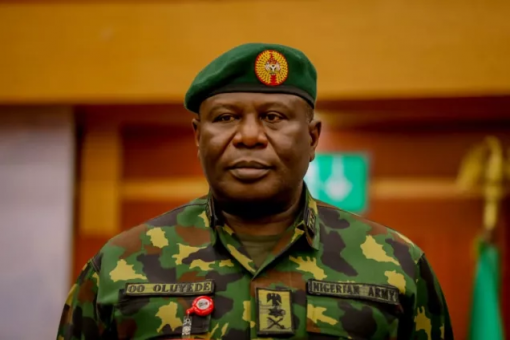Today, President Bola Ahmed Tinubu effected a sweeping change of military leadership, replacing service chiefs amid escalating security concerns. In the reshuffle, Oluyede—previously serving as Chief of Army Staff (COAS)—was elevated to a new top role.
This move underscores the urgency the administration places on tackling insurgency, banditry and internal insecurity.
A career soldier’s rise through the ranks
Born in 1968 in Ikere, Ekiti State, Lieutenant General Oluyede’s journey to the top of Nigeria’s military hierarchy began nearly four decades ago when he joined the Nigerian Defence Academy as part of the 39th Regular Course. He was commissioned as a Second Lieutenant in 1992, beginning a career that has combined frontline command, operational strategy, and international military exposure.
Over the years, Oluyede has served in various capacities, earning a reputation for discipline, operational effectiveness, and reform-minded leadership.
His early years in service saw him take on roles such as Platoon Commander and Adjutant at the 65 Battalion, and later as Company Commander at the 177 Guards Battalion — both postings that tested his leadership in Nigeria’s ever-evolving security environment.
He later served as Staff Officer with the Guards Brigade and Commandant of the Amphibious Training School, where he played a critical role in training officers for special operations in riverine and coastal terrains. His leadership of the 27 Task Force Brigade under Operation Hadin Kai in the North-East, where he fought insurgents, remains one of the most defining periods of his career.
Tested on the battlefield and abroad
Oluyede’s experience is not limited to domestic operations. He was deployed with the ECOWAS Monitoring Group (ECOMOG) in Liberia, where he earned commendations for strategic coordination during peacekeeping operations.
He also participated in Operation Harmony IV in Bakassi — a sensitive cross-border mission that further demonstrated his expertise in regional security and diplomacy.
These experiences have shaped his understanding of both conventional and asymmetric warfare — a blend of tactical awareness and geopolitical insight that few of his contemporaries possess.
By 2020, his consistent record of service earned him promotion to Major General, and in October 2024, he was appointed as the 24th Chief of Army Staff following the sudden death of Lieutenant General Taoreed Lagbaja.
A reformist with a modern military vision
Now at the helm of the Nigerian Army, Lieutenant General Oluyede inherits a force that is stretched across multiple internal and external challenges — from insurgency in the North-East to banditry in the North-West, separatist agitations in the South-East, and growing threats of cross-border arms smuggling.
His vision, according to sources within Defence Headquarters, focuses on transforming the Army into a “well-motivated, combat-ready, and technologically adaptive force.”
Insiders describe him as a calm but firm commander who prioritises troop welfare and operational intelligence. His approach leans heavily on professional discipline, tactical readiness, and inter-agency cooperation — pillars he believes are necessary to restore public trust in the Nigerian military.
The man behind the medals
Beyond his military achievements, Oluyede is known to maintain a reserved and professional public profile. He is married with three children and has received several honours, including the Corps Medal of Honour, Grand Service Star, Field Command Medal of Honour, and the Chief of Army Staff Commendation Award.
Those who have served under him describe him as “deeply principled, quietly assertive, and strategically minded” — a soldier who values both chain of command and innovative thinking.
His leadership style is said to combine the traditional rigour of the old guard with the analytical pragmatism demanded by today’s modern warfare.
Challenges ahead for the new Army Chief
Lieutenant General Oluyede’s appointment comes at a critical moment for Nigeria’s security architecture. Confidence in the military has waned over the years, largely due to persistent insurgent attacks, kidnappings, and the perception of corruption in defence spending.
His immediate challenge will be to restore morale among troops, address long-standing issues of logistics and welfare, and rebuild public trust in the Army’s capacity to protect the nation.
Beyond that, he will be expected to harmonise intelligence sharing with other security agencies, improve civilian-military relations, and adopt new technologies for surveillance and combat operations.
A defining moment for the Tinubu administration
For President Tinubu, the appointment of Oluyede and the simultaneous reshuffling of the service chiefs reflect a broader political message — that the administration is ready to tighten its grip on national security and bring renewed energy to the fight against threats that have long undermined economic stability and social order.
As Nigeria navigates this uncertain phase, all eyes will be on Lieutenant General Olufemi Oluyede — a man whose entire adult life has been defined by service, strategy, and the pursuit of stability. His tenure will not only test his leadership but could also redefine how Nigerians perceive their military in a time of heightened insecurity.









